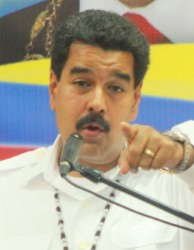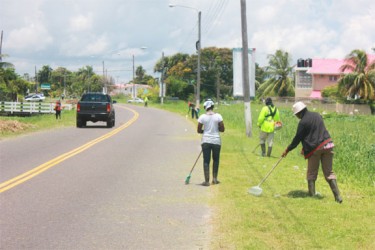On his first official visit as President of the Bolivarian Republic of Venezuela, President Nicolás Maduro and his Guyanese counterpart President Donald Ramotar recommitted to the United Nations Good Offices process in the search for a peaceful and practical settlement of the border controversy between the two South American neighbours.
There were no indications from either President that there had been any changes to PetroCaribe arrangements, and Guyana’s Ambassador to Caracas told Stabroek News that the terms remained the same.
Further, the two leaders signed a declaration in which they committed to putting their nations on a continued path of cooperation on a number of fronts including air transport links and education.

At a joint press conference with Ramotar held at the Guyana International Conference Centre yesterday, Maduro said, “In our discussions today we also agreed to renew the Good Offices Process of the United Nations (UN)” ‒ a reference to the mechanism employed under the Geneva Agreement of 1966 to find a means to resolve the Guyana-Venezuela border controversy. Professor Norman Girvan is the Good Officer in this process.
“We think that Professor Girvan has been doing a good job and we agreed that we will both request that this process be continued. We will [put] that request to the United Nations Secretary General,” he said.
“This colonial issue, this Cold War relic, will not prevent us from trying to promote friendly relationships between our two peoples,” said Ramotar.
Speaking through an interpreter at the press briefing, Maduro said, “We want to ratify as well that we are ready to continue working despite the legacy of the border dispute that we have inherited from the empires of the past and we are ready to continue working through the Good Offices of the United Nations organisation considering this as the sole and successful mechanism to allow us to channel our differences using international law.”
He continued, “The mechanism of the Good Officer is functioning very well. We need to be very straightforward. These are difficult topics and we have decided that these complex matters are going to be channelled through the mechanisms of peace and diplomacy.” He noted that such issues have the potential to raise “tensions.”
In their joint declaration the two Presidents noted the “greater impetus” which had been given to the UN Good Offices process since the appointment of Prof Girvan.
Maduro expressed the opinion that the controversy was a result of a campaign through the media to inject hatred and a psychological position against Guyana with a view to invade the country. “And all this was encouraged by the north, as has been revealed by the declassification of documents of the [US Central Intelligence Agency],” he said. “The purpose was to undermine the independent forces of the left and their leaders,” he said.

Maduro told the media that the two days of meetings have been “extremely successful and a source of encouragement.”
“It is up to our teams now to implement in a successful manner the agreement that we have reached during these two days,” he said. “We hope that through our contribution South America will remain an area of peace, prosperity and development for us all,” said the Venezuelan President.
According to their joint declaration, both Presidents reviewed the achievements of the PetroCaribe mechanism. It said that President Ramotar congratulated President Maduro on the initiative by Venezuela to establish the PetroCaribe Economic Zone (PEZ), created as a means of safeguarding and managing the resources in the region.
“The Presidents emphasized to build up the importance of the PetroCaribe Summit of Heads of State and Government as the appropriate forum for strengthening the initiative and guiding it towards the new challenges and objectives that are imminent,” the declaration said.
Speaking to Stabroek News, Guyana’s Ambassador to Venezuela Geoffrey Da Silva said that there has been no change in any element of the PetroCaribe arrangement, as had been published in media in Venezuela. He said that if there are any changes, these would be for the better and would be revealed in the coming days.
Further, both Presidents expressed optimism for the potential that exists for an enhanced relationship between Caricom and Venezuela that would redound to the benefit of their peoples.
They also acknowledged the roles of Unasur and Celac in bringing the Latin American and Caribbean region closer together and in providing a voice for the region in international fora to address issues of interest and concern to the region, including peace and security, climate change and sustainable development.
At the press conference President Ramotar expressed satisfaction with the talks over the two days, first with an advance team on Friday and then with President Maduro and members of his entourage yesterday.
“Yesterday and today we had a lot of meetings. Several ministries and government officials [took part] and we are very satisfied with the way those talks went,” he said. “As you know we already have strong trade relations in rice, in the PetroCaribe arrangement, and now we have agreements on connections by air and we are also looking at maritime transport, all of which will have the great possibility of broadening our relationship and strengthening and deepening them to the benefit of the Guyanese and Venezuelan people,” said President Ramotar.
“We also recognise in our conversations that we still have a lot of room for improvement of these relationships and we intend to pursue all areas of activity vigorously,” he said.
“We have discussed not only issues related to the bilateral meeting but also the two heads discussed various topics such as energy, economy, cultural, social and political issues and others,” he said.
“We have decided to reinvigorate the bilateral cooperation between the two countries in all these areas,” he said. He also spoke of the two nations aiming to strengthen food security by enhancing cooperation in this area.
The two countries agreed to establish a direct air link between them through CONVIASA airlines.
According to the declaration, the airline has a capacity to transport 70 persons in what is envisaged to be a twice weekly service.
Though not a part of the declaration, Syria became one of the main topics for the two leaders during the media briefing.
Both Presidents made strong statements against any contemplation of war in Syria. President Ramotar said that no action should be taken without the ratification of the United Nations Security Council. “Our fundamental position is always one for peace and it is on that basis that we [take this stand against war],” said President Ramotar.
On the issue of Syria, President Maduro said that on Friday, the nations of Unasur signed a resolution for the parties to respect the ruling of the United Nations “and based on this resolution we also reject any military attack against Syria.” He went on to say that any attack on Syria would be criminal.
Members of the Guyanese media corps complained about the restricted access to which they were subject and noted that their treatment in this respect was markedly different from that accorded the majority of the Venezuelan press.




